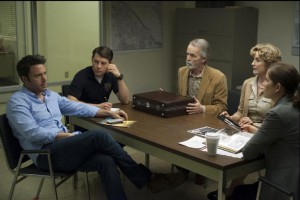By Jonathan Edmondson
Arts & Entertainment Editor
“I will practice believing my husband loves me, but I could be wrong,” writes Amy Dunne (Rosamund Pike), the central character of “Gone Girl,” in her journal toward the end of the first act of the film.
Pike’s voiceover is filled with sickly sincerity and enough ambiguity to make the audience squirm in their seats.
Does her husband love her? Or, better yet, does she love her husband?
These questions help frame this narrative drama based on Gillian Flynn’s novel of the same name. Flynn, who rose to literary stardom after readers everywhere could not stop talking about “Gone Girl” and its ‘you-won’t-believe-it’ twist, also penned the screenplay.
David Fincher, an Oscar-nominee and currently one of cinema’s most popular filmmakers, directed the film, which also stars Ben Affleck as Amy’s husband Nick. Through his modernized scope, viewers are able to watch Flynn’s expertly crafted story come alive in a fiercely captivating way.
The plot, it seems, is very straightforward. Nick comes home from work one afternoon and Amy is missing. He calls the police, and within a matter of hours, all eyes are on him as the prime suspect. It does not help that Nick is utterly apathetic and seemingly detached from the entire situation.
The first act of the film is layered with voice-over diary entries from Amy, recounting tales of her childhood in which she grew up with famous parents. Her mother and father co-wrote a children’s book series called “Amazing Amy,” based on their daughter’s life — or, rather, what they wished her life would be.
Amy also chronicles her romance with Nick, tracing their journey from New York to Missouri, where the young couple would move after both lose their jobs in journalism and Nick’s mother grows ill. Shortly after they move out West, his mother passes away.
The loss of his mother and his job weighs on Nick. He grows increasingly irritable with Amy. In one of her entries, she recalls a moment where he hit her during an argument. As the search for Amy continues in real time, diary entries reveal that just weeks before her disappearance, Amy was afraid that Nick was going to kill her.
What happens next (spoiler alert) is what makes “Gone Girl” one of the most innovative thrillers of the 21st century. Flynn flips the plot on its head when the viewer sees a shot of Amy driving in a car, a bandage around her arm.
“Let me tell you how I did it,” her voice over says.
The rest of the film jumps between Amy and Nick’s story. Everything you originally thought has changed. Nick’s guilt is put into question in a big way.
Of course, the rest of the world does not know Amy is still alive, or that she framed her own disappearance to make her husband’s life a living hell. Part of her master plan involves cutting and dying her hair, ditching her old identity and even hitting her cheekbone with a hammer to dramatically alter her face. Her ultimate goal is to make sure Nick suffers, and Pike pulls off the role of Amy with delivilsh force.
In flashbacks, Pike plays the socialite Amy with misty allure. When she’s hiding away in a cabin after her disappearance, she has biting sarcasm and a tough outer-edge. Her acting dynamics are superb. Pike never falters in a role that is physically, emotionally and mentally demanding. She slips into the role of Amy with such ease that it’s clear why Pike beat out bigger Hollywood names for this coveted role.
Despite Amy’s psychotic nature, Nick is not exactly guilt-free. He has been having an affair with his student, Andie (played with humorous naivete by Emily Ratajkowski), and planned to ask Amy for a divorce the morning she went missing. Affleck is perfectly scummy as Nick, slipping into the role with disinterested ease.
The combined force of Flynn and Fincher help to breathe cinematic life into a novel beloved by millions across the globe.
And the ending?
It’s Pike, aided by Fincher’s stunning direction, at her absolute psychotic best.
Watch out, Oscars — Amazing Amy is coming for you.








